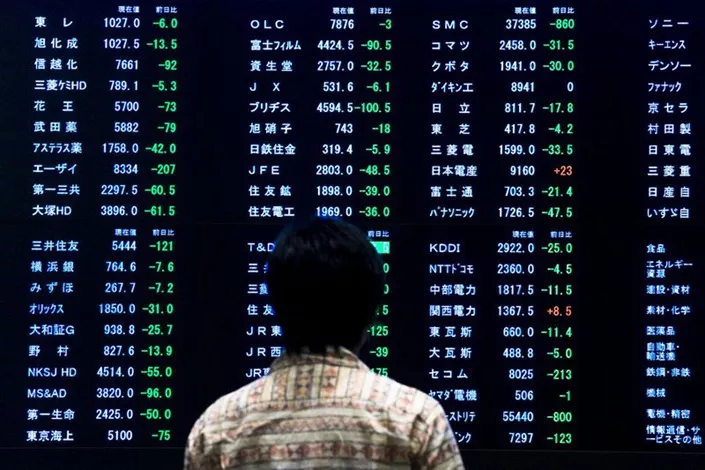Most Asian markets traded in a narrow range on Friday, with Japan’s shares falling after disappointing GDP figures. Hong Kong’s Hang Seng index also dropped sharply, dragged down by a steep decline in Alibaba shares following a weaker-than-expected revenue report.
Markets across the region followed mixed signals from Wall Street, where tech stocks lost momentum and economic data failed to inspire investors. U.S. stock futures dipped slightly in early Asian trading, with S&P 500 futures down 0.1%.
Despite the cautious tone on Friday, both Wall Street and most Asian markets were still on track for weekly gains. This positive momentum was fueled by easing trade tensions after the U.S. and China agreed to reduce tariffs temporarily.
Australia’s market outperformed, gaining on growing expectations that the Reserve Bank of Australia will cut interest rates next week to support the economy.
Japan’s Economy Contracts Sharply, Pressuring Markets
Japan’s Nikkei 225 index fell 0.5%, while the broader TOPIX index dropped 0.3%. This came after official data showed the country’s economy shrank 0.7% year-over-year in the first quarter, a steeper decline than analysts had predicted (0.2%).
The contraction was largely due to weaker exports, hit by rising U.S. trade tariffs, and sluggish domestic consumer spending.
Despite the disappointing GDP, the data increased expectations that the Bank of Japan will maintain its accommodative monetary policy, rather than raising interest rates anytime soon.
Inflation in Japan also remained persistently low, adding to concerns about the country’s economic outlook.
Alibaba’s Revenue Miss Sends Hang Seng Lower
Hong Kong’s Hang Seng index fell over 1%, led by a more than 5% drop in Alibaba shares. The e-commerce giant reported quarterly revenue that missed analysts’ forecasts, particularly in its cloud computing division—key to its artificial intelligence goals.
Alibaba’s competitor, JD.com, also fell 2%, reflecting worries about weak consumer demand in China amid slowing inflation pressures.
One bright spot was video game developer NetEase, which surged more than 15% after releasing strong first-quarter results.
Chinese mainland markets followed suit, with the Shanghai Shenzhen CSI 300 and Shanghai Composite indexes down 0.4% and 0.3%, respectively.
Still, both Hong Kong and mainland Chinese markets logged solid weekly gains between 0.8% and 2%, driven by hopes for a lasting resolution to U.S.-China trade disputes. However, investors remain cautious as tariffs between the two countries stay relatively high and the recent trade truce only offers a temporary pause.
Other Asian Markets Show Mixed Moves
South Korea’s KOSPI index was flat, while Singapore’s Straits Times slipped 0.3% despite strong export growth in April.
Australia’s ASX 200 index rose 0.6% to a two-month high on optimism about an upcoming rate cut by the Reserve Bank of Australia.
In India, Nifty 50 futures pointed to a slightly weaker open following a rally that pushed the index near seven-month highs this week.
Related topics:


